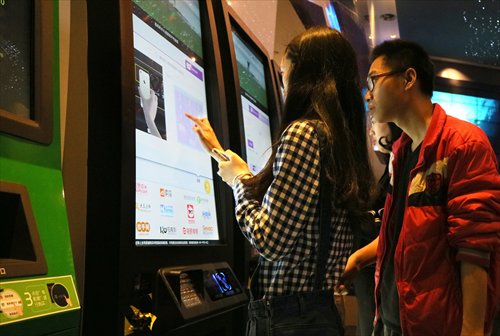China moves swiftly to rein in problematic online sector
As more problems exposed, regulation will only be tightened: experts

Consumers get movie tickets they bought via online platforms such as meituan.com in a cinema in Fuzhou, East China's Fujian Province. File photo: CFP
Chinese market regulators moved swiftly to crack down on illegal activities in the country's burgeoning online e-commerce platforms by releasing a series of probes and directives on Tuesday, a day after a widely watched television show exposed a litany of problematic practices that violate consumers' rights, adding impetus to a widening campaign to rein in illegal activities on the platforms.
The latest moves could be just the beginning of a lasting crackdown on illegal market activities, as such efforts are directly tied to the country's long-term broad drive to boost the domestic market to ensure steady growth amid lingering external risks, analysts said. The moves are also coming as the nation's consumption recovery is relatively slow.
On Tuesday, the State Administration for Market Regulation (SAMR) said in a statement that it has started to take administrative measures to improve the quality of products sold on online livestreaming platforms to protect consumers' rights.
While livestreaming sales have played a positive role in peoples' lives, there are also "prominent problems raised by the general public, including sub-standard products, false advertising, poor after-sales services and a lack of protection for consumer rights," the SAMR said in a statement, demanding that platforms conduct "thorough reviews" of their products.
Those problems were exposed in World Consumer Rights Day gala on Monday night, which shed light on a series of illegal activities that violate consumers' rights. Another a major topic on the show was the illegal gathering of consumer information, including facial recognition data, by both online and offline businesses.
Responding to fraudulent activities and illegal gathering of information targeting the elderly by some mobile applications, the Ministry of Industry and Information Technology said on Tuesday that it was launching serious probes into those activities and severely penalizing violators.
"Despite rapid development, online platforms have become really problematic in terms of personal information gathering and data protection. That is very concerning because it's directly linked to economic and social security," Lu Zhenwang, founder of Shanghai Wanqing Commerce Consulting, which focuses on the consumer market, told the Global Times on Tuesday. "This is just the beginning of tighter regulations."
China's top leaders have repeatedly called for enhanced regulations on online platforms to counter monopolistic practices and disorderly expansion of capital, as part of broad efforts to root out potential risks for the economy.
On Monday, the meeting of the Central Committee for Financial and Economic Affairs doubled down on those calls and stated that all financial activities will be regulated.
At the CMG show on Monday night, the SAMR also issued sweeping regulatory guidelines on online transactions, addressing a slew of illegal activities, including personal data protection and consumer rights protection.
The latest regulatory actions come as China seeks to bolster the domestic consumption market as part of a new development paradigm, while consumption remains relatively sluggish despite a robust economic recovery powered by surging trade.
In the January-February period, China's retail sales grew 33.8 percent - but that was due to a low base in 2020. Consumer spending remained constrained and further consumption boosting efforts are necessary, the Ministry of Commerce said on Tuesday.
That also adds to the urgency of reining in problematic activities in the online e-commerce sector, which has seen robust sales since the outbreak of the COVID-19 due to anti-virus restrictions. This sector has become a main consumption growth driver, accounting for more than 20 percent of total retail sales, analysts said.
Also pushing forward the crackdown campaign is growing willingness among Chinese consumers to take actions to protect their interests and rights, the analysts added.
"With more diverse channels of protecting their rights and interests… Chinese consumers are becoming much more proactive, compared with the situation before," Liu Dingding, a Beijing-based internet industry analyst, told the Global Times on Tuesday, adding that apart from regulatory actions, public scrutiny will also increase on online platforms.




